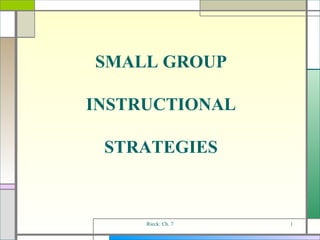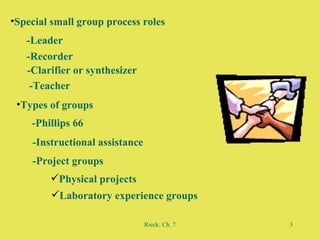Chapter 7
- 1. Rieck: Ch. 7 SMALL GROUP INSTRUCTIONAL STRATEGIES
- 2. USING SMALL GROUPS Rieck: Ch. 7 Group size Advantages Disadvantages Required skills and attitudes -Willing to work in group setting -Desire to participate in group setting -Openness -Avoid negative comments -Willingness to make sacrifices -Self discipline
- 3. Rieck: Ch. 7 Special small group process roles -Leader -Recorder -Clarifier or synthesizer -Teacher Types of groups -Phillips 66 -Instructional assistance -Project groups Physical projects Laboratory experience groups
- 4. Rieck: Ch. 7 -Role playing -Simulation -Panel discussion -Inquiry Guided inductive inquiry Unguided inductive inquiry Discovery OK, how about some examples of inquiry?
- 5. GUIDED INDUCTIVE INQUIRY Rieck: Ch. 7 Problem : To determine what, if any, mathematical relationship exists between the size of an object and its mass. Background : Students indicate how to determine size and mass and are asked about possible relationships. M+V V+M M-V V-M M/V V/M VM Hypothesis: Students write in ink so they can not change their minds
- 6. Rieck: Ch. 7 Procedures: Develop with students Data : Develop with students Sample D+V D-V V-D M /V V/M MV One Two Three Average Conclusion: Developed by students based on data Is this discovery? You bet!
- 7. UNGUIDED INDUCTIVE INQUIRY Rieck: Ch. 7 Problem : There are many ways to fund public education. Each group is to create an “ideal” method for funding and present that method to the class, along with a solid rationale supporting the approach. You may not include any form of tuition in your plan. YOU ARE ON YOUR OWN IS THIS DISCOVERY? NOPE!
- 8. COOPERATIVE LEARNING Rieck: Ch. 7 Theory Must give a group grade Group size Types Jigsaw -Two types Foreign exchange
- 9. EXAMPLE: FOREIGN EXCHANGE Rieck: Ch. 7 Let us plan a two week trip to our state for a tourist We will divide the state into four regions and each group will develop a two week trip for their section Within each group learn about climate, history, entertainment, public areas, etc. Then form pairs for reciprocal teaching so people know 2 areas Form new groups to synthesize results (synthesis group)
- 10. FLOW CHART Rieck: Ch. 7 ABCDEF GHIJKL MNOPQR STUVWX Specialty groups AG MS BH NT Foreign Exchange Pairs (12) AHMT BGNS Synthesis groups (6)
- 11. RIECK’S RULES Rieck: Ch. 7 Use a wide variety of instructional strategies Do not use any one strategy so much that it becomes ineffective or boring Remember, there is no single “ best” way to teach all students. Learning styles and class situations, as well as teacher competency, will dictate what is and is not appropriate.











